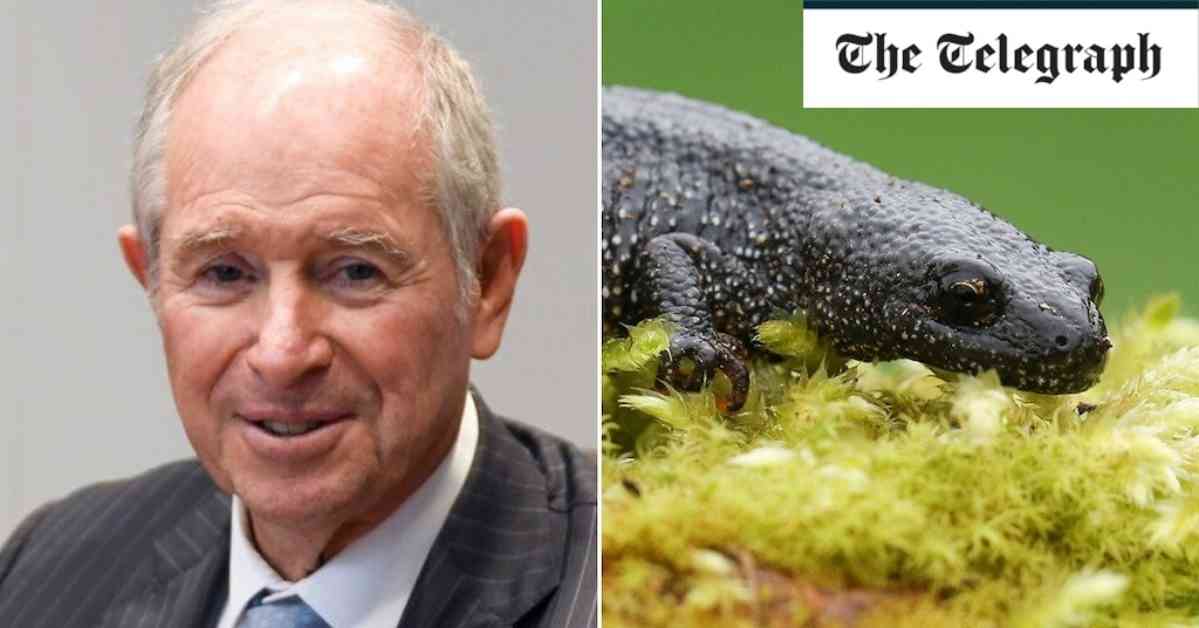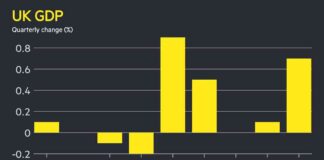Title: Billionaire Financier Stephen Schwarzman Faces Challenges Due to Britain’s Endangered Great Crested Newt
Business mogul Stephen Schwarzman, CEO of the Blackstone Group, is currently embroiled in a conflict with an unlikely opponent that is slowing down his building projects: the great crested newt. Schwarzman’s new £80 million estate in Wiltshire, known as Conholt Park, has become a battleground where he must navigate the complexities of building works in harmony with the protected species that call the area home.
Chancellor Rachel Reeves has been approached by Schwarzman regarding the challenges posed by the great crested newt on his property. The newt, the largest of its kind in Britain measuring up to 17cm long, falls under the protection of the 1981 Wildlife and Countryside Act. This legislation mandates that developers must take measures to protect endangered species like the great crested newt during any construction activities.
Schwarzman’s planning application for Conholt Park includes ambitious projects such as a new lake, a three-storey wing, and the conversion of stables into staff accommodation. However, these plans come with the requirement of a “habitat mitigation and enhancement” plan, which involves monitoring the site for signs of the newts and making necessary accommodations to ensure their protection. Workers are instructed to handle any newts found with care and continue mitigation efforts for at least 30 years after the completion of the development.
The billionaire’s struggle with the great crested newt is not an isolated incident in the world of property development in the UK. Protected species like hazel dormice, bats, and newts have posed challenges for numerous builders and developers over the years. The Wildlife and Countryside Act has led to countless delays and cancellations in construction projects as developers navigate the requirements to protect these species and their habitats.
Steve Turner, executive director of the Home Builders Federation, acknowledges the extensive rules and regulations surrounding protected species but highlights the significant delays caused by the lack of capacity within local authority planning departments. Developers often find themselves caught in a bureaucratic maze as they seek to comply with environmental laws while moving their projects forward.
The issue of protected species disrupting development projects is not limited to Schwarzman’s case. Public figures like Boris Johnson, Tyson Fury, and Andy Murray have all faced challenges due to the presence of bats, newts, and other protected wildlife on their properties. The hurdles posed by these creatures have even led to accusations of intentional interference, with some alleging that environmentalists have strategically placed newts to impede construction projects.
To proceed with construction activities that may impact protected species, developers must obtain a license from Natural England, the government advisory body overseeing environmental matters. While habitat destruction can be permitted under certain circumstances, developers must demonstrate the absence of alternatives and an imperative of overriding public interest to secure approval for their projects.
Despite hopes that Brexit would lead to a relaxation of environmental laws, strict planning regulations and ecological surveys remain in place in the UK. However, the introduction of district licensing has streamlined the process for developers by allowing local planning authorities to hold licenses, eliminating the need for individual surveys and reducing delays and unexpected costs.
Natural England emphasizes the importance of balancing sustainable development with nature conservation, highlighting district level licensing as a solution that benefits both developers and communities. The organization works in partnership with developers and planning authorities to support the construction of new homes while ensuring compliance with environmental regulations.
The great crested newt, with an estimated population of 400,000 throughout the UK, is a key focus of conservation efforts due to its status as the largest and rarest of its kind in the country. Despite their relative abundance in the UK compared to other regions, newt populations have declined significantly over the years, prompting conservationists to advocate for their protection and preservation.
Dr. Tom Tew, CEO of Nature Space UK, underscores the importance of balancing development with wildlife conservation, emphasizing that solutions exist to build homes without harming the environment. While Schwarzman’s situation may suggest a traditional approach to dealing with protected species, consultants have indicated that the newt population at Conholt Park is likely minimal, offering a potential resolution to his conflict.
As developers and policymakers grapple with the challenges posed by protected species like the great crested newt, the future of construction and conservation efforts remains amphibious. While legislative changes and streamlined licensing processes aim to facilitate development while protecting wildlife, the delicate balance between progress and preservation continues to shape the landscape of British development projects.






















